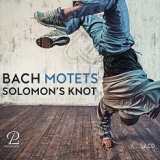Im Begriffe Motette steckt das französische ‘mot’ – Wort. Es geht also um die Verkündigung des Wortes in Bachs Motetten. Dies haben sich die Mitglieder des britischen Ensembles Solomon’s Knot zu Herzen genommen. Musikalisch sind sie voll auf der Höhe – flexibel und wendig in den verwobenen Fugenpassagen, kraftvoll und ausdrucksstark in Choral- und Arienpartien. Der Duktus der Interpretationen orientiert sich klar am Rhythmus der Sprache. Dadurch verleihen sie der Musik die typisch Bachsche Federung, das tänzerische Element als wesentliches Merkmal der Barockmusik. Es bildet einen feinen Kontrast zu den eher betrachtenden, verinnerlichten Momenten, die durch ihren schwebenden Klang nicht gleichgültig lassen.
Solomon’s Knot beschreibt sich als ein Ensemble, das sich stark am Theater inspiriert. Dies wird vor allem in der wunderbaren Dramaturgie der einzelnen Werke klar deutlich. Jede der Motetten von J.S. Bach und seines Vaters Cousin Johann Christoph Bach entwickelt sich zu einem kurzen, fesselnden Schauspiel. Zentrale Worte, Textelemente werden musikalisch mit Engagement und Hingabe ausgestaltet. Dabei gerät der Ensembleklang stellenweise etwas zu kräftig, was die Transparenz des Vortrages hie und da trübt.
Hält man Solomon’s Knot zugute, dass es sich in einer Fremdsprache bewegt, wie sie vor über 300 Jahren lebte, so sind diese packenden Bach-Interpretationen umso höher einzuschätzen.
In the term motet there is the French ‘mot’ – word. So it is about the proclamation of the word in Bach’s motets. The members of the British ensemble Solomon’s Knot have taken this to heart. Musically, they are fully at their best – flexible and agile in the interwoven fugue passages, powerful and expressive in chorale and aria parts. The ductus of the interpretations is clearly oriented to the rhythm of the language. In this way, they give the music the typical Bachian springiness, the dance-like element as an essential characteristic of Baroque music. It forms a fine contrast to the more contemplative, internalized moments, which do not leave one indifferent due to their floating sound.
Solomon’s Knot describes itself as an ensemble that draws much of its inspiration from the theater. This is especially clear in the wonderful dramaturgy of each work. Each of the motets by J.S. Bach and his father’s cousin Johann Christoph Bach develops into a short, compelling drama. Central words and text elements are musically developed with commitment and dedication. At times, the ensemble sound is a bit too powerful, which dulls the transparency of the performance here and there.
If one gives Solomon’s Knot credit for being in a foreign language as it lived over 300 years ago, these gripping Bach interpretations are all the more to be appreciated.






















